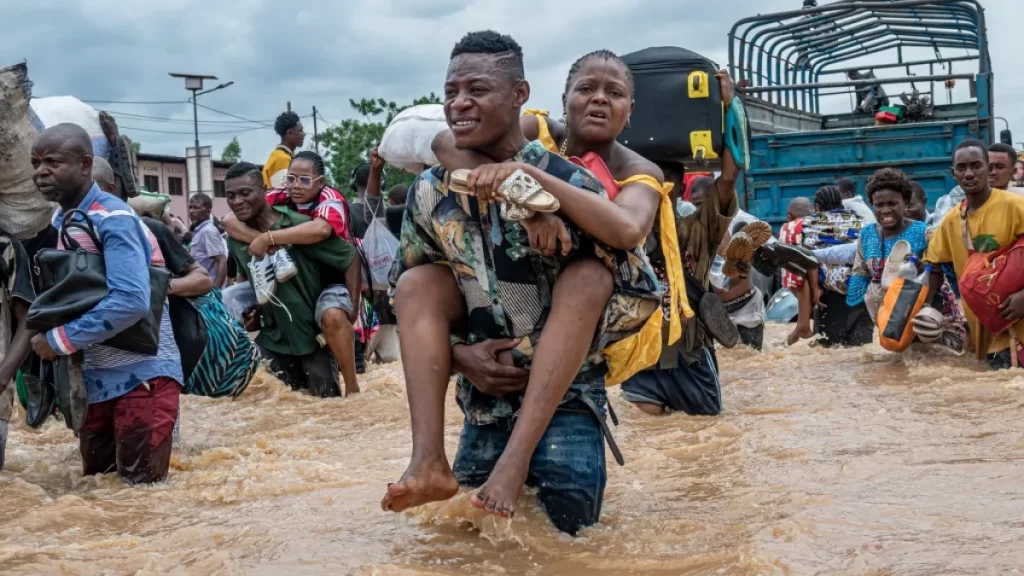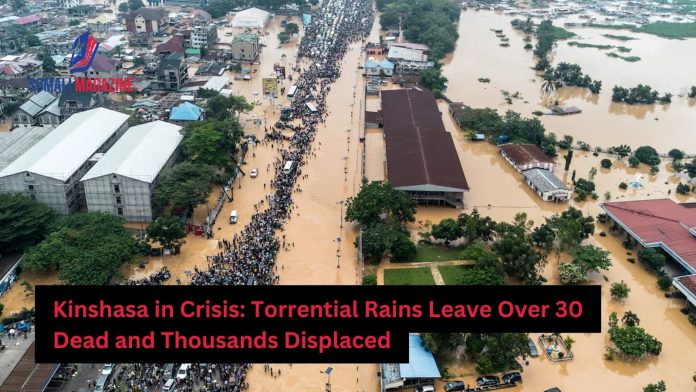Facebook Twitter Instagram Somali Magazine - People's Magazine
The Democratic Republic of Congo’s capital, Kinshasa, is grappling with the aftermath of devastating floods that have claimed the lives of at least 33 people. Torrential rains over the weekend caused the Ndjili River to overflow, submerging entire neighborhoods, destroying homes, and leaving thousands displaced. The disaster has plunged the city of nearly 17 million residents into chaos, with authorities racing to provide relief and restore essential services.
The flooding began late Friday night, April 4, 2025, when heavy rains overwhelmed the city’s drainage systems and caused the Ndjili River to burst its banks. The deluge swept through densely populated areas, collapsing walls, washing away homes, and cutting off access to major roads. Most of the fatalities were caused by structural collapses, with residents caught off guard as the waters rose rapidly.
Kinshasa Governor Daniel Bumba Lubaki confirmed the death toll and described the situation as a humanitarian emergency. “We are facing one of the worst floods in recent memory. Our priority is to save lives and provide shelter to those affected,” he stated. The government has set up emergency shelters across the city, housing hundreds of displaced families. However, many residents remain stranded in flooded areas, awaiting rescue.
The floods have also disrupted critical infrastructure, including power and water supply systems. Several neighborhoods have been left without electricity, while water shortages have compounded the challenges faced by affected communities. Authorities have pledged to restore services within days, but the scale of the damage has made recovery efforts difficult.
The main road connecting Kinshasa to N’djili International Airport was submerged, leaving travelers stranded for hours. Emergency teams have been deployed to clear debris and reopen access routes, but progress has been slow. The flooding has also raised concerns about public health, with stagnant water increasing the risk of waterborne diseases such as cholera.
Residents have expressed frustration over the government’s response, blaming poor urban planning and inadequate drainage systems for exacerbating the disaster. Many of the affected areas are informal settlements built along riverbanks, where residents are particularly vulnerable to flooding. Governor Lubaki acknowledged these challenges and vowed to address illegal housing and improve urban infrastructure to prevent future disasters.

Hydrologists have pointed to human activity as a contributing factor to the severity of the floods. Dr. Raphael Tshimanga Muamba, a leading expert, explained that deforestation and unregulated construction have degraded the Ndjili River’s capacity to contain heavy rainfall. “These are anthropogenic actions that have reduced the river’s ability to manage floods. We need sustainable solutions to address these issues,” he stated.
The disaster has drawn international attention, with humanitarian organizations calling for urgent support to assist affected communities. The United Nations and other aid agencies have mobilized resources to provide food, clean water, and medical supplies to those in need. However, funding constraints and logistical challenges have hampered relief efforts.
This is not the first time Kinshasa has faced deadly floods. In 2022, a similar disaster claimed over 100 lives, highlighting the city’s vulnerability to extreme weather events. As climate change intensifies, experts warn that such incidents are likely to become more frequent and severe, underscoring the need for long-term resilience measures.
President Félix Tshisekedi is expected to visit the affected areas and hospitals treating the injured in the coming days. His administration has pledged to prioritize disaster preparedness and invest in climate-resilient infrastructure to protect vulnerable communities.
The Kinshasa floods serve as a stark reminder of the urgent need for sustainable urban planning and climate adaptation. As the city mourns its losses, the focus remains on providing relief to those affected and preventing future tragedies.

